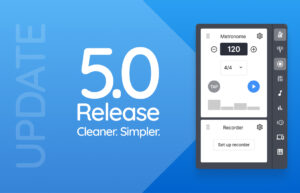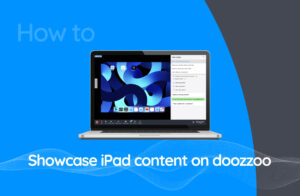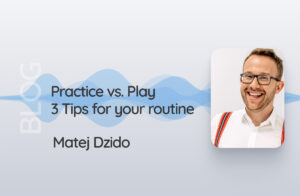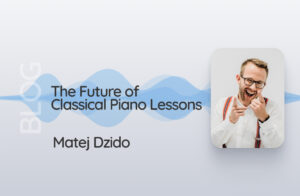The American jazz guitarist David Becker is one of the most outstanding musicians of our time, who received several Grammy and Emmy nominations. He has shared the stage with musicians like Chick Chorea and Miles Davis and passes on his knowledge as a passionate pedagogue as well. The entire interview was truly a highlight and to learn many insights from this legendary artist. A few of them are summarized here:
You are teaching online for many years and tried out different teaching tools. What do you like most about teaching with doozzoo?
David: “Originally I used Zoom and Skype. Those are unreliable because that’s more of a conversational tool. This [doozzoo] is actually designed for a musical conversation and that I can share files immediately. I can share mp3s. I can record the sessions. There’s a metronome. There are little tools that you would have if you were teaching one-on-one with somebody in the same room, and I just find it to be a lot easier to see the screen, having the student next to me and I can see everything.
It’s laid out much easier for me to be able to express what I want to do when I’m teaching because a lot of teaching is conveying things that the person needs to understand in real-time, and if you’re not able to communicate through a source that allows you to do certain things, it’s limiting. So I found that this is the best platform to do that on.”
What is important for you when teaching online?
David: “When I work with people, the most important thing is to make sure that they understand what I’m showing them. […] The advantage on doozzoo is that when I talk about something, if I prepared a PDF of something, which I do a lot, immediately the first thing I do is I upload it for them to see.
They can either put it on the screen or they can, you know, access it, and they can download it. That’s a big advantage. […] I can just put it up on the screen and say: “Here, let’s take a look at this or check this out.” Or I’ll play them an example of something. I can put the MP3 up, and it’s there immediately, or a video of something.”

Why is it important that the tools you use work as simply as possible?
David: “The more I can do, the easier it becomes for me to convey what I want to convey. If things get in the way, and it gets too technical, and things don’t work the way you want, it impedes your ability to teach.
Definitely, if it’s getting too complicated, we don’t want to try it, and then it’s not practical anymore. We have to find the balance between those digital learning tools that are helping.”
David about why recording the lesson is so useful
David: “He just wanted to basically take one lesson and asked if there’s a way to record it. I said: “We can do that.” Saved it and send it to him, so he had that for his archives. That’s the thing, too, that I’ve always allowed people to do.
There are a lot of people when they do workshops, they say “no recording”. I always tell people: “Take your phones out. Record this.” Or people say: “Can I record the lesson?” Well, now, if they want to do it, it’s available on the app. So we can just hit the button, and there we go.
I think it’s important to review what you talk about or what you’ve learned cause if you only do it once, you may not really understand it completely. Or you may understand it incorrectly and that can be a hindrance to learning.”
Your advice for teachers who are still scared to try out online teaching?
David: “The biggest fear is the technology. That something is going to go wrong, and there have been glitches over the years with the technology. That’s obvious that that happens once in a while or the internet breaks up, but you learn to deal with it.
One of the things you said was so important, that about performance. I don’t differentiate this what we’re doing right now with playing a concert for 10,000 people. It’s all the same to me because my being here is to communicate with the audience or the person I’m engaging with, which happens to be you.
It’s the same thing if I’m performing, or I’m talking about music, or I’m doing a lesson or doing an interview. It’s to communicate, go back and forth and utilize that communication skill, and I think that’s the thing about those that are a little afraid of technology.
If you feel comfortable that you have the communication skills to do your job or your calling as an educator, then there’s no problem because that’s not going to hinder you. It’s only going to allow you to reach more people.”
Is teaching online for you an advantage?
David: “Yeah, it allows me to have students. I mean I travel a great deal, or I did before the pandemic, to various countries to perform and do workshops as well. If I have time, I will meet people in person, but then you only have a chance to see them for a short period of time.
This [online music lessons] allows me to see them on a regular basis if they want to continue their study, and I actually acquired quite a number of students in the last few years through that. They were at a workshop somewhere in, you know, Italy and said: “Hey, can I study with you regularly? Is that possible?” I said yes, of course.”
Do you see a disadvantage in learning online?
David: “You know, if people say, well, what about playing together? You know, that’s something that people make records like that now. So, there are ways to do that, but I think when I’m taking the hour, whatever it is, I use to explain somebody something.
My main goal is to make sure that they have the tools to go practice to get something out of it. I think it’s better to give them the nuts and bolts, kind of like saying if you’re going to bake a cake, you know this is the ingredients that you would use and try this and that. Go bake the cake and tell me how it came out. […]
See how that works when you’re playing with this guy, or you know, when you play with the piano player, try this. See if that works, if that’s a better solution. But those are things you can only acquire through the experience you’ve lived yourself, that you can share with the student. But it is possible to do it in this form.”
David’s advice
“Regardless of the tools that we have, you have to investigate, you have to invest the work. The work has to be there, it’s not about: “Well, this tool is going to make you become a virtuoso.” You have to invest the time, and that has not changed in the past 500 years of playing music, but this allows you as an educator or as a student to connect with people that you may never connect with. If you don’t travel outside your town, as you said before, you don’t have the means to do that, or there’s no one around to show you, and that in itself is a great advancement of the whole thing about communicating and also spreading the whole thing of music.”
















